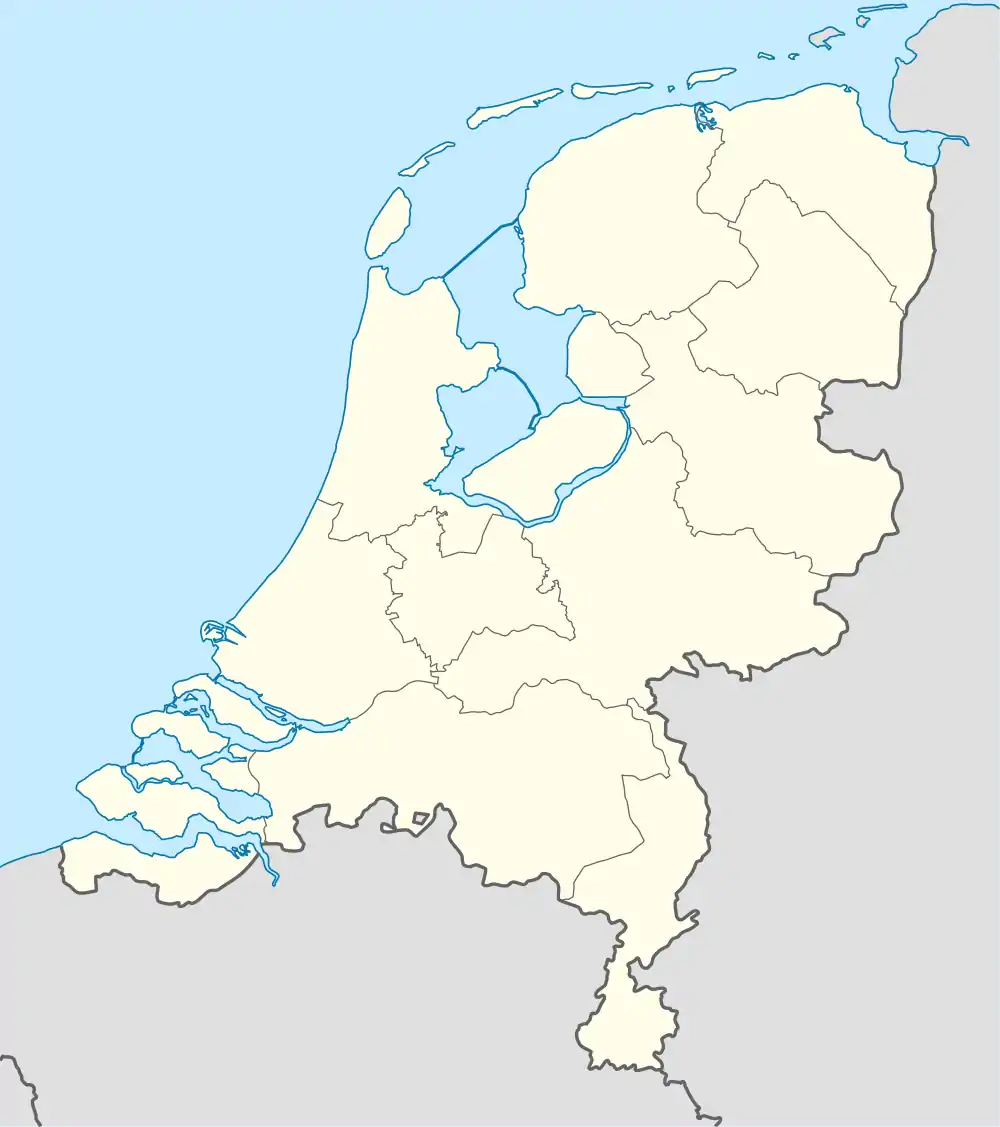| Europees kampioenschap voetbal vrouwen 2017 | |
|---|---|
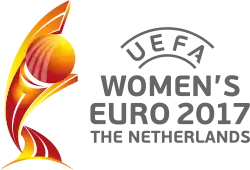 | |
| Tournament details | |
| Host country | Netherlands |
| Dates | 16 July – 6 August |
| Teams | 16 |
| Venue(s) | 7 (in 7 host cities) |
| Final positions | |
| Champions | |
| Runners-up | |
| Tournament statistics | |
| Matches played | 31 |
| Goals scored | 68 (2.19 per match) |
| Attendance | 247,041 (7,969 per match) |
| Top scorer(s) | |
| Best player(s) | |
The 2017 UEFA European Women's Championship, commonly referred to as UEFA Women's Euro 2017, was the 12th edition of the UEFA Women's Championship, the quadrennial international football championship organised by UEFA for the women's national teams of Europe. The competition was expanded to 16 teams (from 12 teams in the previous edition).[1]
The Netherlands was chosen to host the tournament by the UEFA Executive Committee on 4 December 2014.[2]
Germany's 22-year reign as champions of Europe was ended after losing 1–2 to Denmark in the quarter-finals.[3] It was only Germany's second loss in the tournament since 1993.[4] Another former winner, Norway, lost to both finalists, the Netherlands and Denmark, and ended without goals or points.
The Netherlands won their first ever title since the men's UEFA Euro 1988 by beating fellow first time finalists Denmark 4–2 in the final.[5]
Austria, Belgium, Portugal, Scotland and Switzerland made their debuts for the first time.
Host selection
Expressions of interest in hosting the tournament were received from seven associations.[6]
On 4 December 2014 The Netherlands were chosen as hosts for the first time having never previously staged the tournament.[7]
Qualification
A total of 47 UEFA nations entered the competition (including Andorra which entered for the first time at senior women's level), and with the hosts Netherlands qualifying automatically, the other 46 teams competed in the qualifying competition to determine the remaining 15 spots in the final tournament.[2][8] The qualifying competition, which took place from April 2015 to October 2016, consisted of three rounds:[9]
- Preliminary round: The eight lowest-ranked teams were drawn into two groups of four teams. Each group was played in single round-robin format at one of the pre-selected hosts. The two group winners advanced to the qualifying group stage.
- Qualifying group stage: The 40 teams (38 highest-ranked teams and two preliminary round qualifiers) were drawn into eight groups of five teams. Each group was played in home-and-away round-robin format. The eight group winners and the six best runners-up (not counting results against the fifth-placed team) qualified directly for the final tournament, while the two remaining runners-up advanced to the play-offs.
- Play-offs: The two teams played home-and-away two-legged matches to determine the last qualified team.
Qualified teams
The following 16 teams qualified for the final tournament. Five teams made their Women's Euro debuts. The only team that qualified in 2013 but did not qualify in 2017 was Finland.
| Team | Method of qualification |
Date of qualification |
Finals appearance |
Last appearance |
Previous best performance |
FIFA ranking at start of event |
|---|---|---|---|---|---|---|
| Hosts | 4 December 2014 | 3rd | 2013 | Semi-finals (2009) | 12 | |
| Group 3 winners | 11 April 2016 | 6th | 2013 | Quarter-finals (2009, 2013) | 3 | |
| Group 5 winners | 12 April 2016 | 10th | 2013 | Champions (1989, 1991, 1995, 1997, 2001, 2005, 2009, 2013) | 2 | |
| Group 6 winners | 4 June 2016 | 1st | — | Debut | 17 | |
| Group 7 winners | 7 June 2016 | 8th | 2013 | Runners-up (1984, 2009) | 5 | |
| Group 8 winners | 7 June 2016 | 11th | 2013 | Champions (1987, 1993) | 11 | |
| Group 2 winners | 7 June 2016 | 3rd | 2013 | Semi-finals (1997) | 13 | |
| Group 4 winners | 15 September 2016 | 10th | 2013 | Champions (1984) | 9 | |
| Group 1 winners | 16 September 2016 | 3rd | 2013 | Quarter-finals (2013) | 19 | |
| Group 1 runners-up[^] | 16 September 2016 | 1st | — | Debut | 21 | |
| Group 7 runners-up[^] | 16 September 2016 | 1st | — | Debut | 22 | |
| Group 8 runners-up[^] | 20 September 2016 | 1st | — | Debut | 24 | |
| Group 4 runners-up[^] | 20 September 2016 | 9th | 2013 | Third place (1991, 1993) | 15 | |
| Group 6 runners-up[^] | 20 September 2016 | 11th | 2013 | Runners-up (1993, 1997) | 18 | |
| Group 5 runners-up[^] | 20 September 2016 | 5th | 2013 | Group Stage (1997, 2001, 2009, 2013) | 25 | |
| Play-offs winner | 25 October 2016 | 1st | — | Debut | 38 |
- Notes
- ^ The best six runners-up among all eight groups qualified for the final tournament.
Final draw
The final draw was held on 8 November 2016, 17:30 CET (UTC+1), at the Luxor Theatre in Rotterdam.[10][11] The 16 teams were drawn into four groups of four teams. The teams were seeded according to their coefficient ranking following the end of the qualifying group stage (excluding the play-offs),[12] with the hosts Netherlands assigned to position A1 in the draw. Each group contained one team from each of the four seeding pots.[13]
| Team | Coeff | Rank |
|---|---|---|
| 34,642 | 9 | |
| 42,957 | 1 | |
| 42,355 | 2 | |
| 39,880 | 3 |
| Team | Coeff | Rank |
|---|---|---|
| 39,161 | 4 | |
| 38,036 | 5 | |
| 37,655 | 6 | |
| 36,629 | 7 |
| Team | Coeff | Rank |
|---|---|---|
| 34,775 | 8 | |
| 34,141 | 10 | |
| 33,632 | 11 | |
| 32,915 | 12 |
| Team | Coeff | Rank |
|---|---|---|
| 31,882 | 13 | |
| 31,213 | 14 | |
| 30,367 | 15 | |
| 22,900 | 23 |
- H Hosts (assigned to position A1 in the draw)
- TH Title holders
Venues
Seven venues in seven different towns were used in the tournament.[2]
| Breda | Enschede | Utrecht |
|---|---|---|
| Rat Verlegh Stadion | De Grolsch Veste | Stadion Galgenwaard |
| Capacity: 19,000 | Capacity: 30,205 | Capacity: 23,750 |
| 4 group matches, 1 semi-final | 1 semi-final, Final | 4 group matches |
 |
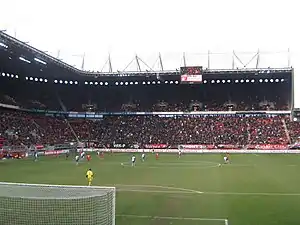 |
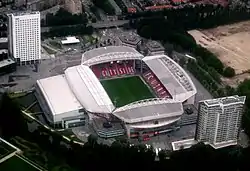 |
| Rotterdam | Deventer | |
| Sparta Stadion Het Kasteel | De Adelaarshorst | |
| Capacity: 10,600 | Capacity: 10,500 | |
| 4 group matches, 1 quarter-final | 4 group matches, 1 quarter-final | |
 |
 | |
| Tilburg | Doetinchem | |
| Koning Willem II Stadion | De Vijverberg | |
| Capacity: 14,500 | Capacity: 12,500 | |
| 4 group matches, 1 quarter-final | 4 group matches, 1 quarter-final | |
 |
 |
Match officials
A total of 11 referees, 21 assistant referees and 2 fourth officials were appointed for the final tournament.[14]
|
|
|
|
Squads
Each national team have to submit a squad of 23 players, three of whom must be goalkeepers. If a player is injured or ill severely enough to prevent her participation in the tournament before her team's first match, she can be replaced by another player. The squad list must be published no later than 10 days before the tournaments opening match.[9]
Group stage
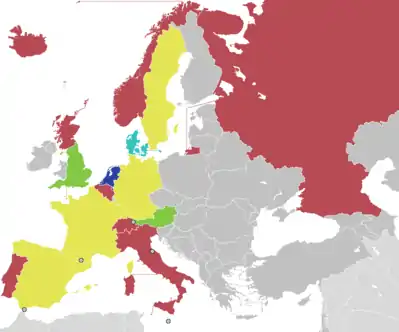
Winner Runner-up |
Semi-finals Quarter-finals |
Group stage |
The schedule of the competition was announced on 23 September 2015.[15] The group winners and runners-up advance to the quarter-finals.
All times are local, CEST (UTC+2).[16]
Tiebreakers
Teams are ranked according to points (3 points for a win, 1 point for a draw, 0 points for a loss), and if tied on points, the following tiebreaking criteria are applied, in the order given, to determine the rankings (Regulations Articles 19.01 and 19.02):[9]
- Points in head-to-head matches among tied teams;
- Goal difference in head-to-head matches among tied teams;
- Goals scored in head-to-head matches among tied teams;
- If more than two teams are tied, and after applying all head-to-head criteria above, a subset of teams are still tied, all head-to-head criteria above are reapplied exclusively to this subset of teams;
- Goal difference in all group matches;
- Goals scored in all group matches;
- Penalty shoot-out if only two teams have the tied after applying all criteria above, met in the last round of the group, and rankings are relevant for qualification for the next stage;
- Disciplinary points (red card = 3 points, yellow card = 1 point, expulsion for two yellow cards in one match = 3 points);
- UEFA coefficient for the final draw.
Group A
| Pos | Team | Pld | W | D | L | GF | GA | GD | Pts | Qualification |
|---|---|---|---|---|---|---|---|---|---|---|
| 1 | 3 | 3 | 0 | 0 | 4 | 1 | +3 | 9 | Knockout stage | |
| 2 | 3 | 2 | 0 | 1 | 2 | 1 | +1 | 6 | ||
| 3 | 3 | 1 | 0 | 2 | 3 | 3 | 0 | 3 | ||
| 4 | 3 | 0 | 0 | 3 | 0 | 4 | −4 | 0 |
Group B
| Pos | Team | Pld | W | D | L | GF | GA | GD | Pts | Qualification |
|---|---|---|---|---|---|---|---|---|---|---|
| 1 | 3 | 2 | 1 | 0 | 4 | 1 | +3 | 7 | Knockout stage | |
| 2 | 3 | 1 | 1 | 1 | 4 | 3 | +1 | 4 | ||
| 3 | 3 | 1 | 0 | 2 | 2 | 5 | −3 | 3 | ||
| 4 | 3 | 1 | 0 | 2 | 5 | 6 | −1 | 3 |
Group C
| Pos | Team | Pld | W | D | L | GF | GA | GD | Pts | Qualification |
|---|---|---|---|---|---|---|---|---|---|---|
| 1 | 3 | 2 | 1 | 0 | 5 | 1 | +4 | 7 | Knockout stage | |
| 2 | 3 | 1 | 2 | 0 | 3 | 2 | +1 | 5 | ||
| 3 | 3 | 1 | 1 | 1 | 3 | 3 | 0 | 4 | ||
| 4 | 3 | 0 | 0 | 3 | 1 | 6 | −5 | 0 |
| Iceland | 1–2 | |
|---|---|---|
| Friðriksdóttir |
Report |
|
| Switzerland | 1–1 | |
|---|---|---|
| Crnogorčević |
Report | Abily |
Group D
| Pos | Team | Pld | W | D | L | GF | GA | GD | Pts | Qualification |
|---|---|---|---|---|---|---|---|---|---|---|
| 1 | 3 | 3 | 0 | 0 | 10 | 1 | +9 | 9 | Knockout stage | |
| 2 | 3 | 1 | 0 | 2 | 2 | 3 | −1 | 3[lower-alpha 1] | ||
| 3 | 3 | 1 | 0 | 2 | 2 | 8 | −6 | 3[lower-alpha 1] | ||
| 4 | 3 | 1 | 0 | 2 | 3 | 5 | −2 | 3[lower-alpha 1] |
Knockout stage
In the knockout stage, extra time and penalty shoot-out are used to decide the winner if necessary.[9]
On 1 June 2017, the UEFA Executive Committee agreed that the competition would be part of the International Football Association Board (IFAB)'s trial to allow a fourth substitute to be made during extra time.[17]
Bracket
| Quarter-finals | Semi-finals | Final | ||||||||
| 29 July – Doetinchem | ||||||||||
| 2 | ||||||||||
| 3 August – Enschede | ||||||||||
| 0 | ||||||||||
| 3 | ||||||||||
| 30 July – Deventer | ||||||||||
| 0 | ||||||||||
| 1 | ||||||||||
| 6 August – Enschede | ||||||||||
| 0 | ||||||||||
| 4 | ||||||||||
| 30 July – Rotterdam | ||||||||||
| 2 | ||||||||||
| 1 | ||||||||||
| 3 August – Breda | ||||||||||
| 2 | ||||||||||
| 0 (3) | ||||||||||
| 30 July – Tilburg | ||||||||||
| 0 (0) | ||||||||||
| 0 (5) | ||||||||||
| 0 (3) | ||||||||||
Quarter-finals
| Germany | 1–2 | |
|---|---|---|
| Kerschowski |
Report |
|
Semi-finals
| Netherlands | 3–0 | |
|---|---|---|
|
Report |
Final
| Netherlands | 4–2 | |
|---|---|---|
| Report |
Statistics
Goalscorers
- 5 goals
- 4 goals
- 3 goals
- 2 goals
- 1 goal
 Stefanie Enzinger
Stefanie Enzinger Lisa Makas
Lisa Makas Sarah Zadrazil
Sarah Zadrazil.svg.png.webp) Janice Cayman
Janice Cayman.svg.png.webp) Elke Van Gorp
Elke Van Gorp.svg.png.webp) Tessa Wullaert
Tessa Wullaert Pernille Harder
Pernille Harder Theresa Nielsen
Theresa Nielsen Sanne Troelsgaard
Sanne Troelsgaard Katrine Veje
Katrine Veje Fran Kirby
Fran Kirby Jordan Nobbs
Jordan Nobbs Nikita Parris
Nikita Parris Ellen White
Ellen White Camille Abily
Camille Abily Amandine Henry
Amandine Henry Eugénie Le Sommer
Eugénie Le Sommer Josephine Henning
Josephine Henning Isabel Kerschowski
Isabel Kerschowski Dzsenifer Marozsán
Dzsenifer Marozsán Fanndís Friðriksdóttir
Fanndís Friðriksdóttir Cristiana Girelli
Cristiana Girelli Daniëlle van de Donk
Daniëlle van de Donk Shanice van de Sanden
Shanice van de Sanden Ana Leite
Ana Leite Elena Danilova
Elena Danilova Elena Morozova
Elena Morozova Erin Cuthbert
Erin Cuthbert Caroline Weir
Caroline Weir Vicky Losada
Vicky Losada Amanda Sampedro
Amanda Sampedro.svg.png.webp) Ramona Bachmann
Ramona Bachmann.svg.png.webp) Ana-Maria Crnogorčević
Ana-Maria Crnogorčević.svg.png.webp) Lara Dickenmann
Lara Dickenmann
- Own goal
 Millie Bright (playing against Netherlands)
Millie Bright (playing against Netherlands)
Source: UEFA.com[20]
Awards
The following awards were given at the conclusion of the tournament by UEFA.[21]
| Player of the Tournament[22] |
|
|---|---|
| Golden Boot[23] | 5 goals 0 assists 328 minutes played |
| Silver Boot[23] | 4 goals 0 assists 536 minutes played |
| Bronze Boot[23] | 3 goals 2 assists 525 minutes played |
| Goalkeeper | |
|---|---|
| Defenders | |
| Midfielders | |
| Forwards |
Prize money
A total prize money of €8,000,000 were available, an increase from €2,200,000 in 2013, with the following breakdown:[25]
| Stage | Prize money | Teams |
|---|---|---|
| Group stage | €300,000 | 8 |
| Quarter-finals | €500,000 | 4 |
| Semi-finals | €700,000 | 2 |
| Runners-up | €1,000,000 | 1 |
| Champions | €1,200,000 | 1 |
Broadcasting rights
Matches were streamed on UEFA.com and UEFA.tv (YouTube) in territories where no partner had been appointed.[26]
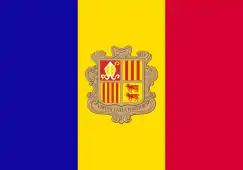 Andorra – TVE, France Télévisions[26]
Andorra – TVE, France Télévisions[26] Austria – ORF[26]
Austria – ORF[26].svg.png.webp) Belgium – RTBF / VRT[26]
Belgium – RTBF / VRT[26] Brazil – Globosat[26]
Brazil – Globosat[26] Chile – Telecanal[26]
Chile – Telecanal[26] Denmark – DR / TV 2[26]
Denmark – DR / TV 2[26] Ecuador – RedTeleSistema[26]
Ecuador – RedTeleSistema[26] Finland – Yle[26]
Finland – Yle[26] France – France Télévisions[26]
France – France Télévisions[26] Germany – ARD / ZDF[26]
Germany – ARD / ZDF[26]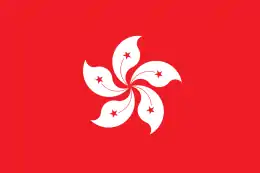 Hong Kong – iCable[26]
Hong Kong – iCable[26] Iceland – RÚV[26]
Iceland – RÚV[26] Indonesia – MNC / RCTI[26]
Indonesia – MNC / RCTI[26] Italy – Nuvola61 / RAI[26]
Italy – Nuvola61 / RAI[26] Malaysia – Astro[26]
Malaysia – Astro[26]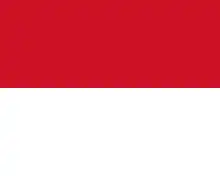 Monaco – France Télévisions[26]
Monaco – France Télévisions[26] Netherlands – NOS[26]
Netherlands – NOS[26] Norway – NRK / TV 2[26]
Norway – NRK / TV 2[26] Portugal – RTP[26]
Portugal – RTP[26] Russia – Match TV[26]
Russia – Match TV[26] Spain – TVE[26]
Spain – TVE[26] Sweden – TV4 / SVT[26]
Sweden – TV4 / SVT[26].svg.png.webp) Switzerland – SRG SSR[26]
Switzerland – SRG SSR[26] United Kingdom – Channel 4[27] More4
United Kingdom – Channel 4[27] More4 United States – ESPN / Univision[26]
United States – ESPN / Univision[26]- Caribbean – ESPN[26]
- Middle East / North Africa – Eurosport / beIN Sports[26]
- Sub-Saharan Africa – Econet (Kwesé Sports)[26]
- Europe – Eurosport[26]
Notes
References
- ↑ "Women's EURO and U17s expanded". UEFA.com. 8 December 2011.
- 1 2 3 "Netherlands to host UEFA Women's EURO 2017". UEFA.com. 4 December 2014.
- ↑ "Women's Euro 2017: Germany 1-2 Denmark". BBC Sport. 30 July 2017.
- ↑ UEFA.com (30 July 2017). "Germany's 22-year Women's EURO domination in numbers". UEFA.com.
- ↑ "Dutch delight: how the Netherlands won Women's EURO". UEFA.com. Union of European Football Associations. 6 August 2017. Retrieved 6 August 2017.
- ↑ "Seven nations express 2017 interest". UEFA.com. 28 June 2013.
- ↑ "Netherlands to host 2017 women's European Championships". BBC Sport. 4 December 2014.
- ↑ "Record entry for Women's EURO". UEFA.com. 18 December 2014.
- 1 2 3 4 "Regulations of the UEFA European Women's Championship, 2015–17" (PDF). UEFA.com.
- ↑ "Women's EURO draw on 8 November in Rotterdam". UEFA.com. 27 July 2016.
- ↑ "UEFA Women's EURO 2017 draw". UEFA.com. 8 November 2016.
- ↑ "UEFA Women's National Team Coefficient Ranking" (PDF). UEFA.com.
- ↑ "France, England join Netherlands, Germany as top seeds". UEFA.com. 6 October 2016.
- ↑ "Women's EURO referees – the tournament's 17th team". UEFA. 22 June 2017.
- ↑ "Women's EURO 2017 schedule announced". UEFA.com. 23 September 2015.
- ↑ "UEFA Women's Euro 2017 Match Schedule" (PDF). UEFA.com.
- ↑ "Comprehensive bidding regulations approved for all finals and final tournaments". UEFA.org. 1 June 2017.
- ↑ "Germany v Denmark quarter-final postponed to Sunday". UEFA.com. Union of European Football Associations. 29 July 2017. Retrieved 29 July 2017.
- ↑ "Netherlands vs. Denmark - 6 August 2017". Soccerway. Perform Group. 6 August 2017. Retrieved 6 August 2017.
- ↑ "Statistics — Tournament phase — Player statistics — Goals". UEFA.com. Retrieved 6 August 2017.
- ↑ "UEFA Women's EURO 2017 roll of honour". UEFA.com. Union of European Football Associations. 6 August 2017. Retrieved 6 August 2017.
- ↑ "Lieke Martens named player of the tournament". UEFA.com. Union of European Football Associations. 6 August 2017. Retrieved 6 August 2017.
- 1 2 3 "Jodie Taylor wins Women's EURO adidas Golden Boot". UEFA.com. Union of European Football Associations. 6 August 2017. Retrieved 6 August 2017.
- ↑ "Official UEFA Women's EURO 2017 Best Eleven". UEFA.com. Union of European Football Associations. 7 August 2017. Retrieved 7 August 2017.
- ↑ "Lyon to host 2018 UEFA Europa League final". UEFA. 9 December 2016.
- 1 2 3 4 5 6 7 8 9 10 11 12 13 14 15 16 17 18 19 20 21 22 23 24 25 26 27 28 29 UEFA.com. "UEFA.com". UEFA.com. Archived from the original on 2017-07-03.
- ↑ Dowell, Ben (15 November 2016). "Channel 4 replaces BBC as home of live Women's Euro 2017 football". Radio Times. Retrieved 21 May 2017.
